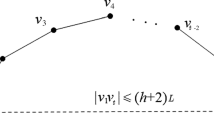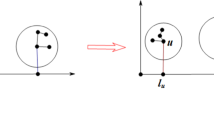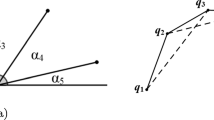Abstract
Given n terminals in the Euclidean plane and a positive constant l, find a Steiner tree T interconnecting all terminals with the minimum total cost of Steiner points and a specific material used to construct all edges in T such that the Euclidean length of each edge in T is no more than l. In this paper, according to the cost b of each Steiner point and the different costs of some specific materials with the different lengths, we study two variants of the Steiner tree problem in the Euclidean plane as follows: (1) If a specific material to construct all edges in such a Steiner tree has its infinite length and the cost of per unit length of such a specific material used is c 1, the objective is to minimize the total cost of the Steiner points and such a specific material used to construct all edges in T, i.e., \({{\rm min} \{b \cdot k_1+ c_1 \cdot \sum_{e \in T} w(e)\}}\), where T is a Steiner tree constructed, k 1 is the number of Steiner points and w(e) is the length of part cut from such a specific material to construct edge e in T, and we call this version as the minimum-cost Steiner points and edges problem (MCSPE, for short). (2) If a specific material to construct all edges in such a Steiner tree has its finite length L (l ≤ L) and the cost of per piece of such a specific material used is c 2, the objective is to minimize the total cost of the Steiner points and the pieces of such a specific material used to construct all edges in T, i.e., \({{\rm min} \{b \cdot k_2+ c_2 \cdot k_3\}}\), where T is a Steiner tree constructed, k 2 is the number of Steiner points in T and k 3 is the number of pieces of such a specific material used, and we call this version as the minimum-cost Steiner points and pieces of specific material problem (MCSPPSM, for short). These two variants of the Steiner tree problem are NP-hard with some applications in VLSI design, WDM optical networks and wireless communications. In this paper, we first design an approximation algorithm with performance ratio 3 for the MCSPE problem, and then present two approximation algorithms with performance ratios 4 and 3.236 for the MCSPPSM problem, respectively.
Similar content being viewed by others
References
Chen D.H., Du D.Z., Hu X.D., Lin G.H., Wang L.S., Xue G.L.: Approximations for Steiner trees with minimum number of Steiner points. J. Glob. Optim. 18, 17–33 (2000)
Chiang, C., Sarrafzadeh, M., Wong, C.K.: A powerful global router: Based on Steiner min-max trees. 1989 IEEE International Conference on Computer-Aided Design, IEEE, 2–5 (1989)
Chung F.R.K., Graham R.L.: A new bound for the Euclidean Steiner minimal trees. Ann. N.Y. Acad. Sci. 440, 328–346 (1985)
Coffman, E.G., Garey, M.R., Johnson, D.S.: Approximation algorithms for bin packing: a survey. In: Hochbaum, D.(ed.) Approximation Algorithms for NP-Hard Problems, pp. 46–93 PWS Publishing, Boston (1996)
Du D.Z., Hwang F.K.: A proof of Gilbert-Pollak’s conjecture on the Steiner ratio. Algorithmica 7, 121–135 (1992)
Garey M.R., Graham R.L., Johnson D.S.: The complexity of computing Steiner minimal trees. SIAM J. Appl. Math. 32, 835–859 (1977)
Garey M.R., Johnson D.S.: Computers and Intractability: A Guide to the Theory of NP-Completeness. W.H. Freeman, San Francisco (1979)
Gilbert E.N.: Minimum cost communication networks. Bell. Syst. Tech. J. 9, 2209–2227 (1967)
Gilbert E.N., Pollak H.O.: Steiner minimal trees. SIAM J. Appl. Math. 16, 1–29 (1968)
Hwang F.K., Richard D.: Steiner tree problems. Networks 22, 55–89 (1992)
Hwang F.K., Richard D., Winter P.: The Steiner Minimum Tree Problems. Annals of Discrete Mathematics 53, North-Holland (1992)
Ivanov A.O., Tuzhilin A.A.: The Steiner ratio Gilbert-Pollak conjecture is still open (Clarification Statement). Algorithmica 62(1–2), 630–632 (2012)
Li, C.S., Tong, F.F.K., Georgiou, C.J., Chen, M.: Gain equalization in metropolitan and wide area optical networks using optical amplifiers. In: Proceedings of IEEE INFOCOM’94, 130–137 (1994)
Lin G.H., Xue G.L.: Steiner tree problem with minimum number of Steiner points and bounded edge-length. Inf. Process. Lett. 69, 53–57 (1999)
Papadimitriou C.H., Steiglitz K.: Combinatorial Optimization: Algorithms and Complexity. Dover Publications Inc., New York (1998)
Ramamurthy, B., Iness, J., Mukherjee, B.: Minimizing the number of optical amplifiers needed to support a multi-wavelength optical LAN/MAN. In: Proceedings of IEEE INFO-COM’97, 261–268 (1997)
Schrijver A.: Combinatorial Optimization: Polyhedra and Efficiency. Springer, The Netherlands (2003)
Simchi-Levi D.: New worst-case results for the bin-packing problem. Nav. Res. Logist. 41(4), 579–585 (1994)
Soukup J.: On minimum cost networks with nonlinear costs. SIAM J. Appl. Math. 29, 571–581 (1975)
Vazirani V.V.: Approximation Algorithms. Springer, Berlin (2001)
Author information
Authors and Affiliations
Corresponding author
Rights and permissions
About this article
Cite this article
Li, J., Wang, H., Huang, B. et al. Approximations for two variants of the Steiner tree problem in the Euclidean plane \({\mathbb{R}^2}\) . J Glob Optim 57, 783–801 (2013). https://doi.org/10.1007/s10898-012-9967-3
Received:
Accepted:
Published:
Issue Date:
DOI: https://doi.org/10.1007/s10898-012-9967-3




